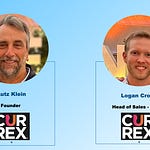This week we had the honor to interview again Dr. Ron Dick, associate professor of sports marketing at Duquesne University in the school of business. Ron also worked for 20 years in sports, including 15 years in the NBA with the Sixers and the Nets, and then four years in the NCAA.
📝Show Notes: Through this interview, we touched on the impact of COVID into sports after a year into the pandemic. We also talked about the Tokyo Olympics, the mental health issues faced by athletes, as well as student athletes now being compensated financially.
🚀Best Quotes: Here’s some of the key discussion points and best quotes from our conversation with Ron:
On what we have learned so far from the pandemic: “I think the teams are about as close to back to normal as we can expect at this time in July 2021. I also think that a lot of the lost ticket revenue has been recouped now, and it is a little stronger and stronger in each event, in each week, and in each month. If we look at the four major sports, the MLB was really hurt last year with playing only 60 games and having no fans in the stands. The NHL just cut a league up in Canada because Canada will not allow the US to go back and forth. And in baseball, as a matter of fact, our Toronto Blue Jays are still playing in Buffalo. And that has really made the playoff situation difficult. The NBA did not do the Bubble like they did in 2020, and it seemed to work out okay for them. And regarding the NFL, they lost a lot of ticket revenue, but they're primarily known for their TV revenue, as is the NCAA. We're going to get into some NCAA stuff today. I just want to mention that the NCAA lives off of, and pays for most of its staff in Indianapolis, Indiana, by way of the television revenue from March Madness, the NCAA Tournament, which there wasn't one in March 2020. At least this year, they could have the tournament in their own pseudo bubble in Indianapolis. And yes, they lost a lot of ticket revenue, but they got the bulk of that CBS TV money, which is what they really need to survive”.
On the Tokyo Olympics, which is taking place without the fans this year: “So imagine a group of people or that many millions of people in something the size of Idaho. This whole six-foot distancing is almost impossible to do. It's got to be one of the highest populations in the world. And for them to have their gross national product, their GNP to be in the top five in the world is just astonishing. So I think that's really where they're running into problems, is the density of the population (..). I think they just gotta bite the bullet on losing that ticket revenue and keep all the athletes healthy, and the fans and the people healthy, try to get herd immunity, try to have more vaccines, and just take the television revenue and be done with it”.
On the negative impact that sometimes hosting some Olympics can have on cities: “This whole thing about hosting the Olympics and how it's a financial bonanza, that's absolutely a falsehood. You look in 1976 in Montreal, that almost crippled that city by taking on the summer Olympics, when at the time, Bruce Jenner was on the Wheaties box and was the decathlon winner. And those of us that are over 50 remember that. And that left that city bankrupt. And now the same thing happened to Brazil. I mean, all the poverty that was around in Brazil is still there. These stadiums are just white elephants that just sit there and no one knows what to do with them. You've still got to heat them and clean them, and do the maintenance on them. But yet, they always say they're going to have so many super events afterwards, but it never comes to fruition. So hosting the Olympics may financially hurt Tokyo a little bit, but they have other events they plan on doing. So let's hope that it happens”.
On many athletes (e.g. Osaka, Phelps..) suffering from mental health issues: “I think mental illness is one of those social events or social topics that has absolutely come a long way in a short amount of time. I mean, for those of us again that are over 50 years old, we remember the embarrassment (...) people would just live in denial that even though they obviously had a mental issue problem, they would just sweep it under the carpet. It was too embarrassing to talk about. And now I think we've shed light on it. Kevin Love came out with the Cleveland Cavaliers to talk about it. And I think that's so healthy that people, especially young people look up to. "So yes, I do have a problem. Yes, I want to talk about it. Most recently, Michael Phelps. I think that's a wonderful thing. I don't know why we had that problem back in the '70s and the '80s when it was perceived to be an embarrassment. If I have a heart issue, I'm going to take medicine for it. If I have a chemical imbalance in my brain, I should take the medicine for it. I mean, that's just common sense”.
On the impact of social media on the Gen Z’s mental health: “I personally deal with millennials and Gen Zs all the time, and I'll ask them, "Why are you so sad? Why do I get the sense in this room, Monday, Wednesday, Friday from 09:00 to 09:50, that you're not happy? And it bothers me that you're not happy. And I don't understand. You've got your whole life ahead of you, you've come from pretty well-to-do families. You have so many things to live for, but yet you're depressed. (..) There's a term called fear of missing out, FOMO. I'm sure you've heard of that or some of your listeners may have heard of that. That's very real. They feel like they're not included in something. Or if they see a picture on TikTok or for the older generation, Facebook, they're like, "Wow, what a great life. My life isn't very good. Look at this. I should be there instead of where I am right now. And I'm like, "I don't understand why you get caught up in all that. (..) But there's another one called fear of better options. They're so paralyzed with the decision-making process like, "What am I going to do this weekend? Where's the in-crowd? Who should I date? Who should I not date?".
On US student athletes now getting compensated financially, and the fact that the general public still has mixed feelings about this: “I think it's really important, I think it's long overdue. I'm in the majority that have that opinion, but certainly not 100%. I'd say about a 75 or 70 to 30 split. There are still about 25 to 30% people out there that think it's a bad idea. Most of them are athletic directors or presidents or provosts of schools that are not in the Power Five conferences.
On a student athlete recently getting a $1M endorsement deal: “You just saw that the Alabama quarterback just got paid a little around a million dollars for his endorsements as the proposed starting quarterback for the Crimson Tide. He has not played. He's not started a game yet, but some companies are prepared to take this on. Now, this paying the players thing is not something new. You can go back almost 10 years ago, and Steve Spurrier, when he was the head coach of the University of South Carolina, he said, "I would like to propose that you take the money out of my salary. And I would like to pay each player, 70 players, $300. I would like to do it for the 10 games in the SEC. Well then, Nick Saban immediately said, "I'll do it. I mean, obviously all of us will do it." Because at the end of the day, all that is, is $210,000. That's a drop in the bucket for a coach that makes six million a year. Coach K is getting ready to retire. And I think he's getting out right on time as the head coach of the Duke Blue Devils men's basketball team, 30 years ago, a media person said, "Hey, I heard you make hundreds of thousands of dollars for the Tar Heels and the Blue Devils, which are both in Nike. You get paid by Nike so that the players here in 1991 are wearing Nike. He says, "Don't you think that Christian Laettner, Bobby Hurley and Grant hill shake a piece of that?" And Coach K to his credit said, "The mechanisms are not in place to pay those players, but I hear what you're saying. Well, guess what? The mechanisms 30 years later are now in place”.
On the Bucks winning the NBA title this year:“They won it in 1971 with Oscar Robertson, Lou Alcindor, who is now Kareem Abdul-Jabbar, and a few other very good players. So yes, it was 50 years ago. Their star player Giannis Antetokounmpo recently said that they won a championship without having a super team, which raised a lot of eyebrows when he said that. And then he went back to when he was drafted and he put on 40 pounds of muscle, and he actually got taller. And he said, "I'm going to win a championship and I'm going to win it here." And that's very similar to what Michael Jordan said. And that's really a slap at, I think, LeBron. But then again, LeBron did go on. (..) So I think that's a slap at Durant too. But I don't think it's a slap at Stephen Curry. So yeah. It was a very interesting thing. It sounds a lot better when you're the champion saying that, doesn't it?”.
On the Bucks’ chances to repeat next year: “I think they've got a good chance to come out of the East. I think it depends on who comes out of the West. But I think they got a chance. Absolutely, because this will give them confidence that they never had before. So yeah, I think they got a chance.
On the impact of foreign players on the NBA nowadays: “ The NBA is such a global sport, it's not just in the United States now. So we've got 450 guys that play on rosters right now, do you know almost a 100 of them were foreigners born outside the United States? So almost 25%, between 20 and 25% are not US born. And some of them are the greatest players of their time, of their country. They sold a lot of Dirk Nowitzki jerseys over in Germany. As you would know, you saw a lot of. And a lot of Tony Parker's jerseys in Paris, France (..) The NBA gets their piece on that. I wouldn't say it's as global as soccer, but I'd say it's the second most global sport in the world”.
⭐ Upside VC Spotlight: Causeway Media Partners
🔥Upside Chat: Pierre Barrieu, High Performance Director, Toronto FC (MLS)
🔥Upside Chat: Alberto Maiorana, Sorare (NFT Sports leader)
🔗 🚴 NFT Reached $2.5B in 1H21. SoulCycle's NY Sales Up +55%. Fitbit ring coming?














🔥Upside Chat: Dr Ron Dick, Duquesne University on COVID-19, The Tokyo Olympics, Student Athletes Getting Paid.